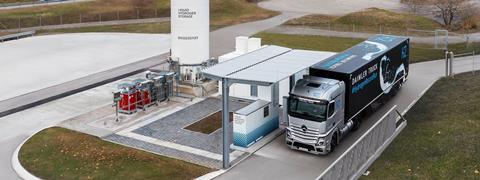Daimler Truck and Linde Engineering have collaborated to introduce a new liquid hydrogen refueling technology called subcooled liquid hydrogen (sLH2), offering higher storage density, extended range, quicker refueling, reduced costs, and improved energy efficiency compared to hydrgoen gas storage and distribution.

The aim of Daimler Truck and Linde Engineering is to establish sLH2 as a common refueling standard for hydrogen-powered trucks and make it accessible to all interested parties through an ISO standard. The first public sLH2 fuel station has been inaugurated in Wörth am Rhein, Germany, and will be used for initial customer trials with the Mercedes-Benz GenH2 Truck starting mid-2024.
“Zero-emission transport needs three factors: the right battery-electric and hydrogen-powered vehicles, the required infrastructure network and cost parity for ZEVs compared to diesel trucks,” explained Andreas Gorbach, Member of the Board of Management of Daimler Truck AG, responsible for Truck Technology. ”In terms of vehicles, the transformation is in full swing. In terms of hydrogen infrastructure, we are reaching a major milestone: With sLH2, hydrogen refueling becomes as convenient as today’s refueling with diesel. It takes about 10 to 15 minutes to fuel our Mercedes-Benz GenH2 Truck for a range of more than 1,000 kilometers. We now call on other OEMs and infrastructure companies to follow our approach and jointly make this technology an industry standard.”
The sLH2 technology significantly improves the efficiency of Hydrogen refueling systems, reducing both investment and operational costs. Compared to conventional gaseous hydrogen refueling, sLH2 simplifies the process while enhancing performance. The pilot refueling station in Wörth am Rhein boasts impressive energy efficiency and performance metrics, consuming significantly less energy compared to gaseous hydrogen refueling stations.
Daimler Truck and Linde Engineering are committed to establishing sLH2 as the leading hydrogen refueling technology for heavy-duty trucks. They have standardized the technology through an open ISO process and invite other OEMs, infrastructure companies, and associations to adopt the new liquid hydrogen standard to foster a global mass market for the process.


















